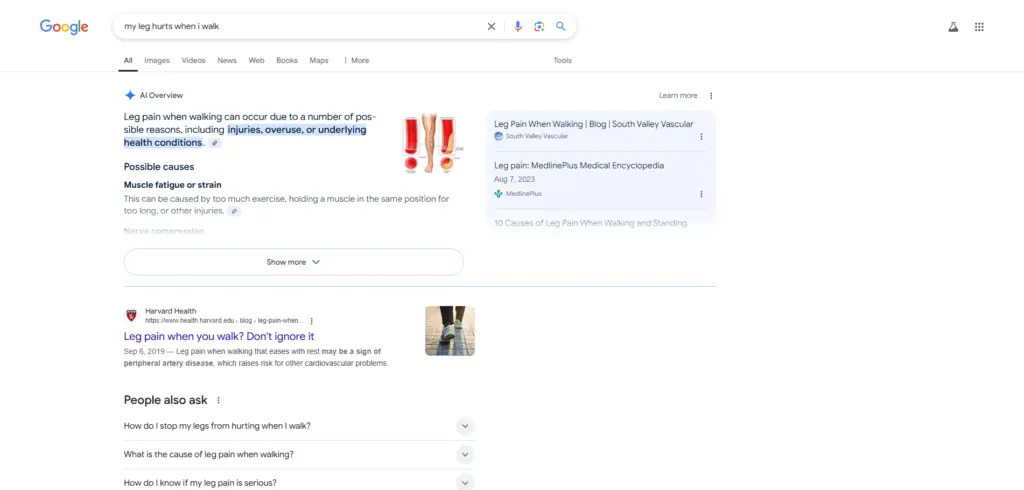2025 brings an evolving digital landscape that no one could have predicted. For many business leaders, one question remains: does SEO matter anymore? The answer, emphatically, is yes. While AI platforms like ChatGPT and AI-driven Google search experiences with a slew of technologies to come rewriting the rules on how search engines work, SEO remains a critical building block of any successful digital strategy.
SEO in 2025: What to Expect
Continued importance
SEO is not dead- it’s just evolving. As AI tools advance in sophistication, understanding user intent and developing content to meet those needs will only grow in importance. Search engines are becoming very good at understanding context and relevance, so the core principles of SEO- optimizing your content, improving your website’s usability, and ensuring your site matches user expectations- will continue to be important in 2025.
Key Trends
- AI Integration: AI will continue to play a huge role in search engines, making them smarter and capable of handling complex queries. This means that high-quality, contextually relevant content will take precedence over mere keyword optimization.
- User-Centric Content: It is not about merely providing information, but the content being engaging, informative, and tailored to individual user experiences. Optimizations for Core Web Vitals, mobile compatibility, and assurance of user satisfaction would all be intrinsic parts.
- E-E-A-T: It is short for Experience, Expertise, Authoritativeness, and Trustworthiness-the more these qualities are manifested, the higher websites with them would show in results.
Moving With Changes
Winning Strategies
Since changes keep coming with AI’s adoption in search engine optimization, companies need to change with time to win in this competition.
- Diversification of Traffic Sources: SEO shouldn’t be your only traffic source. Relying solely on organic search can be risky. Diversify your digital marketing efforts by exploring other channels, such as video content, social media, and paid advertising.
- Quality over Quantity: Unique, high-quality content is a must-have in the present scenario when AI-generated content is mushrooming. Businesses must focus on creating original content that genuinely engages users rather than churning out articles based on SEO tools.
- Adopt New Technologies: Though AI can help in content analysis, optimization, and data insights, human oversight is still required. AI tools can make processes easier but cannot replace human creativity, emotional intelligence, or a nuanced understanding of a brand’s voice.
Key Challenges in AI-Driven SEO
As AI’s role in SEO grows, several challenges need to be addressed:
- Algorithm Updates and Adaptation: Search engines continuously update their algorithms, which can upset SEO strategies. AI tools need to up their game with these updates, and businesses should be nimble enough to change their tactics in time.
- Balancing Automation with Human Oversight: While AI can automate most of the tasks involved in SEO, it still misses the creative touch that humans give. Over-reliance on AI will result in generic, unengaging content. A balanced approach is what works.
- Quality Control of AI-Generated Content: AI-generated content often lacks originality and may suffer from inaccuracies, raising concerns about authenticity and quality. Human review is essential to ensure content meets the high standards expected by users and search engines.
- Ethical Considerations and Data Privacy: AI introduces ethical concerns, especially regarding data privacy and compliance with regulations like GDPR. Transparency in AI’s data usage is crucial.
- AI Content Competition: With more than one business getting hold of an AI solution that creates content automatically, this increases competition tenfold, meaning individual survival could get tougher. Again, emphasis on top-level quality, differential, value-filled substance for audiences matters most. One can think:
Key Risks of AI-Generated Content for SEO
Considering the recent points given above, significant risks emanating from improper SEO reliance upon an AI engine will thus read as :
- Lack of Originality and Duplicate Content: AI tends to develop content based on existing material that may lead to duplicate content, which search engines penalize. Quality and Accuracy Issues: Sometimes, AI-generated content may contain factual inaccuracies or lack in-depth information, affecting a brand’s credibility, especially when accuracy is expected.
- Poor user experience: AI content lacks the emotional resonance and engagement that human-created content does. This leads to a higher bounce rate and reduced conversion rates.
- Misinformation risks: Misinformation spread due to lack of fact-checking may damage the brand reputation and negatively impact the SEO performance of a website.
- Poor SEO performance: Overreliance on AI-generated content might lead to poor SEO performance in the long run, given that algorithms can evolve to favor human-written high-quality content.
Enhancements with AI in SEO
Despite these pitfalls, AI has the potential to significantly enhance your SEO strategy when used appropriately:
- Smarter content creation: With AI, one can create near-human content at scale, thus making it more efficient and better aligned with user intent.
- Predictive SEO: AI lets one analyze historical data for predictive SEO, helping businesses stay one step ahead with algorithm updates and changing strategies in a proactive way.
- Stronger Keyword Research: AI will analyze large datasets to identify trending keywords and content gaps. This makes the content relevant and competitive.
- Automated Technical Audits: AI can rapidly identify technical SEO issues such as broken links and slow page speed. It also provides actionable insights for improvement.
- Data-Driven Insights: AI reveals fantastic insights through customer sentiment analyses that help refine and shape the content for better engagement with the target audience.
- Competitor Analysis: With the AI tool by your side, a business will be assured of competitor performance tracking over and over to make any strategic tweak at blindingly phenomenal speeds.
Changes in SEO Practices Because of AI-Driven Search

User intent and context should be the basis of SEO strategy. No more ‘keyword density‘ and the like; create content based on user intent and contextual relevance.
- Lower Dependence on Traditional Metrics: AI search features may reduce dependency on traditional metrics like click-through rates and page views. There would be an increased focus on engagement metrics and the quality of traffic instead.
- Adaptation of Content Strategies: SEO strategies must adapt to newer formats that search results will take in the future. Traditional organic listings will have to adjust to AI-generate summary results.
- Importance of Technical SEO: Site speed, mobile friendliness, and AI-optimized algorithms would become important factors.
Even in 2025, when AI is increasingly playing a role in getting accurate search results, SEO still needs its importance.
With these very changing dynamics that are happening globally in the online world, integrating AI technologies to quality content-based initiatives will keep companies ahead and pertinent online.


